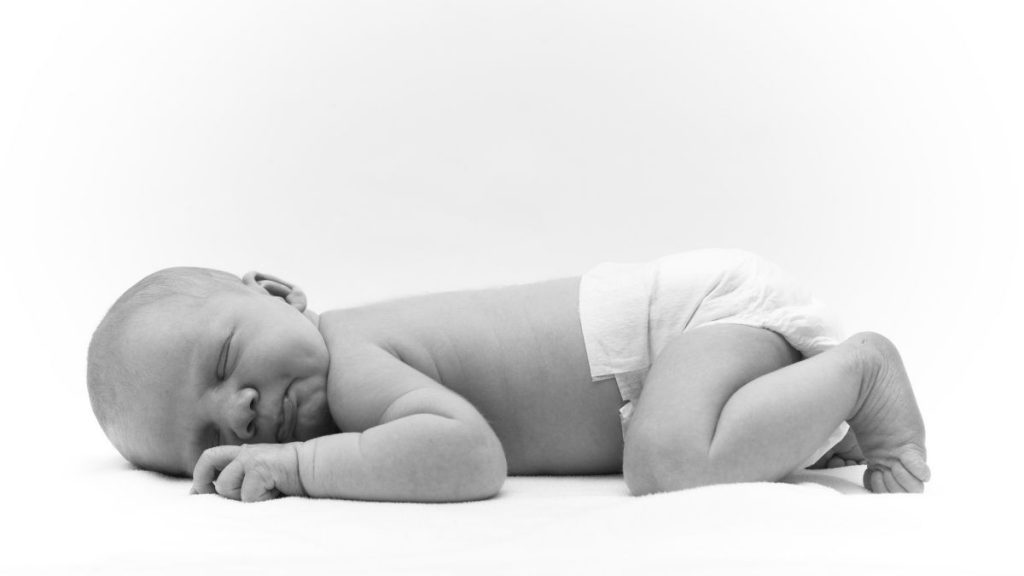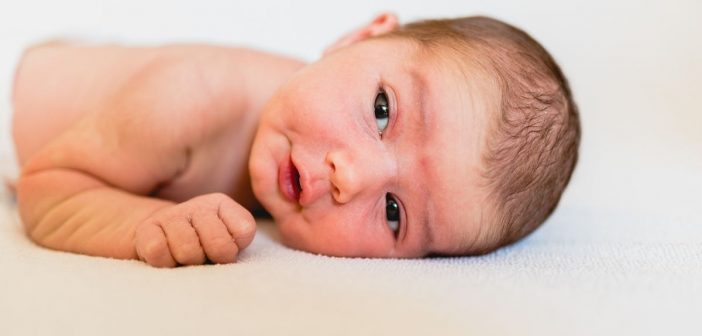The first week of your baby’s development may be both exciting and stressful. You can feel as if you can’t picture living without your child. You might also be surprised that your life can alter so significantly in such a short period. Your new-born is very new, but the first week of life is when they experience the most child growth and development.
Concentrate on the most vital things. Rest and recovery are the most crucial things you and your baby require right now.
Feed both your body and your child for child growth. Your body has gone through a huge physical achievement, whether you gave birth vaginally or by C-section. As a result, your body requires rest and replenishment. So, while you’re focused on feeding your kid (whether at the breast or with a bottle), make sure you’re getting enough nutrients yourself.

Milestones in Your Baby’s Development
Your baby focuses on fine-tuning the abilities needed to survive outside of the womb at the age of one week. What are the most important considerations for baby’s development? Suckling, digesting, and establishing a different microbiome from mom by establishing a healthy immune system and digestive system.
Because the sense of smell and touch is so vital in your baby’s development right now, it’s crucial to have as much skin-to-skin contact as possible this week. So, early on, you may notice a lot of reactions, such as appearing startled or shivering—both of these are normal reflexes.
The breathing pattern of neonates is one of the most important factors to consider when monitoring your baby’s development. Your baby’s breathing will be erratic at one week old, with regular episodes of apnea (when they stop breathing altogether).
This can be frightening to watch at first when monitoring your baby’s development, but erratic breathing in new-borns is really relatively common, especially while they are asleep.
Of course, you should always keep an eye out for a problem and adhere to safe sleeping practices.
You may generally expect your baby to have a spontaneous or nearly reflexive smile in the first week of your baby’s development, which can happen as early as the first few days of life and should be present by ten weeks. This is distinct from the social smile that appears in response to anything, such as speaking or singing to your child. While monitoring your baby’s development you may notice that when babies are 1-2 months old, they begin to acquire a sociable smile.
They should also be able to move their arms and legs equally on both sides of their bodies. Another thing to note while monitoring your baby’s development is that one-week-old babies, for example, should not move one arm or leg significantly more than the other, as this could indicate damage or weakness.
On their tummies, one-week-old newborns can usually elevate their heads for a few seconds. However, keep in mind that newborn babies have weak head control and require constant head support.
They can also focus briefly on things up to 12 to 15 inches away from the face, which is roughly the distance a breastfeeding baby would look at their mother’s face.
Babies can see simple, high-contrast patterns at this age, but their vision will rapidly mature in the coming months. Your kid may also be able to respond to loud noises and stare at and follow objects that are close to their face’s midline.
When Should You Be Concerned?
Although 1-week-old babies sleep a lot, you should consult your baby’s doctor if they don’t wake up for feedings or have any changes in activity levels that make them appear much more lethargic than typical.
If you detect any other symptoms, such as yellowing skin or a fever, you should see a doctor. Fevers in a 1-week-old can indicate a severe infection, so don’t wait to send your baby to the doctor or to the emergency room.
An Average Day in the Life
A one-week-old baby will sleep for the majority of the day. According to the National Sleep Foundation, babies should rest for 14 to 17 hours every 24-hour day.
Because a baby’s body hasn’t yet developed its own circadian rhythm with consistent melatonin synthesis, they don’t have the same sleep habits as an older child. Therefore, a schedule isn’t necessary when monitoring your baby’s development.
As a result, when it comes to your baby’s sleep, it’s better to just go with the flow and stay stress-free. They’ll eventually settle into a routine, and you’ll be able to stick to a schedule.
Until then, your days and nights may be a little disjointed during the first week. Feeding the baby, sleeping, resting, and changing the diapers will be part of your everyday routine. Everything will be a little of a challenge in the first week, and that’s absolutely natural.
Allow yourself lots of time to get to know what it’s like to be a new parent! Then, ensure you get the basics if you haven’t already had a baby shower or received the goods you’ll need for a newborn.
Basics of Baby Care
From diapers to bathtime to soothing tactics, here’s everything you need to know about caring for a 1-week-old baby.
Care of the Umbilical Cord
It used to be recommended that parents rub alcohol on their baby’s umbilical cord until it fell off, but this is no longer the case. In approximately a week, your baby’s umbilical cord will fall off on its own.
Baths with sponges
It’s usually recommended to give your baby a sponge wash during this period to avoid getting the umbilical cord too wet (and to help it dry off). You can use a baby bath that doesn’t go all the way to the belly button or simply spread a towel on the floor and rub your belly button with a warm rag. To clean your baby’s skin, start with soapy water and then warm water.
A lot of “cheesy” white stuff may be visible. That’s vernix, which was created to protect your baby’s skin while in the womb and is perfectly normal during the baby’s development in the first week. You can wipe it off, but it will absorb into your baby’s skin as well. Also, your kid’s skin may appear dry and cracked at this time, which is a side effect of being in the womb and is entirely harmless to your infant.
Changing Diapers
In the first week of your baby’s development, you need to note that your 1-week-old infant will still be passing meconium (a mixture of skin cells, mucus, and other material eaten before birth), which causes the bowel movements to appear dark, dense, and almost tar-like in appearance in the first few days of life. Cleaning those diaper changes can be difficult, but it’s typical.
Your baby’s faeces will shift from a thick, green, tar-like substance (meconium) to green/yellow transitional stools, and finally to the more regular yellow bowel movements of an older infant throughout this week.
Trimming their nails
When your baby’s fingernails become long, you should trim them to prevent unintentional scratching of the face or, more critically, the eye. You can trim them with a baby nail clipper or a nail file. You may need an extra pair of hands, or you can perform it while your baby sleeps or eats to avoid any unnecessary movement.
Burping
To avoid gas and fussiness, you should burp your baby after each feeding. However, if your baby spits up a lot when you burp them throughout the feeding, wait until the very end.
Breastfed babies may not need to be burped as often as bottle-fed newborns since they swallow less air during feeding. However, because every baby is different, pay close attention to how yours behaves after eating. It might be time for a burp if they feel fussy or uncomfortable right away.
Try a different holding posture if you’re having problems getting your baby to burp. For example, try burping your infant when they are laying against your shoulder. Then, if they don’t burp, change their position to a more upright one and burp when they’re sitting up.
Nutrition & Feeding
In the first week of your baby’s development, You may still be determining your favourite feeding strategy for a 1-week-old infant, and it may change as your baby grows. Breast milk from the breast expressed breast milk from a bottle, formula from a bottle, or a combination of breast milk and formula are all options for feeding your baby.
While monitoring your baby’s development You may notice that your infant is especially tired and uninterested in eating for the first 24 hours following birth. This is normal when babies recuperate from delivery (they went through a lot, too), so count how many wet and dirty diapers your baby has to make sure they are receiving enough to eat.
Immunizations
While taking care of your baby’s development , it is important to know that Your baby will receive the Hepatitis B vaccine (first immunization) when they are born one week, which is sometimes given straight in the hospital before discharge.
This vaccination is given so early to protect a new-born from being infected by a family member who may or may not know that they are infected. The Hepatitis B vaccine is safe to give to babies. 12 Common Issues
Jaundice is one of the most common concerns for parents of a 1-week-old infant. Jaundice is a disorder that occurs when a newborn baby’s bilirubin level is too high. In addition, because a 1-week-old baby is still adjusting to life outside the womb, some of the excess red blood cells from pregnancy and birth may take longer to remove.
When Should You Contact Your Pediatrician?
Contact your baby’s doctor right away if you have any concerns about their health or feeding. For example, notify your doctor if the colour of your baby’s skin or eyes is becoming more yellow (bordering on orange) or if the colour is below the belly button level.
If your baby is not nursing or sucking from a bottle well or does not have enough wet diapers, these are some possible concerns that need to be addressed. Contact your paediatrician if your infant is difficult to wake up, does not sleep well, or is really unhappy.




